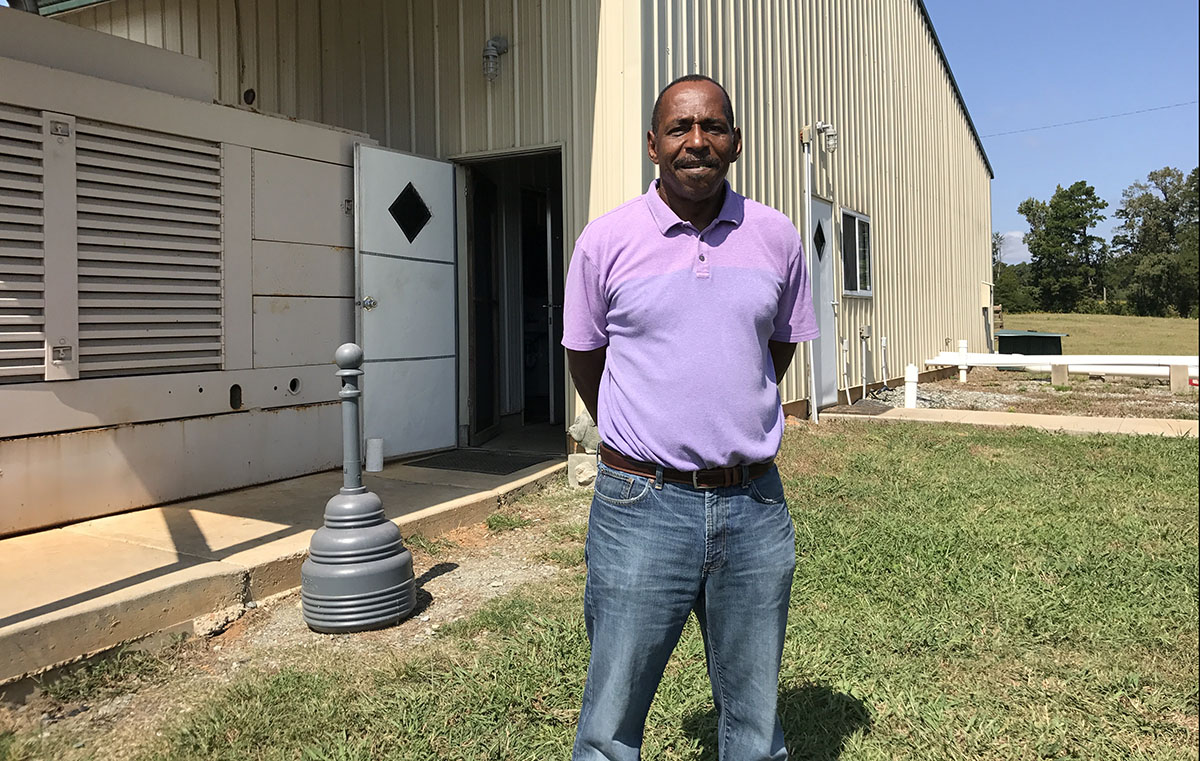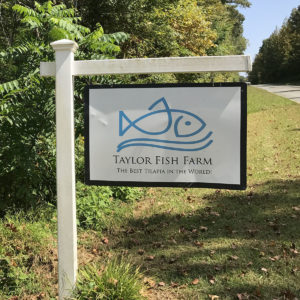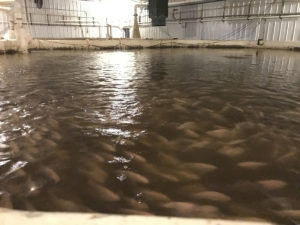Taylor Fish Farm Shares Mission of Sustainability

Valee Taylor, owner of Taylor Fish Farm
Taylor Fish Farm has an unusual back story and a bright future, as Bon Appétit Manager of Strategic Initiatives Nicole Tocco Cardwell and Fellow Shira Kaufman learned when the pair visited this Fish to Fork vendor in Cedar Grove, NC.
Co-owner Valee Taylor explained that the property used to be a tobacco farm subsidized by the U.S. Department of Agriculture. When these subsidies were cut (due to the health concerns surrounding tobacco), many tobacco farmers were offered a buyout. Although the buyout was far from comparable to the revenue from tobacco subsidies, the Taylors decided to use the money to start over with a new vision: a farm based on faith, community, and sustainability.
 Why fish? And why tilapia? Valee explained that in the Bible, tilapia is the fish that Jesus fed to 5,000 people. Five years prior to starting Taylor Fish Farm, Valee’s mother had donated a piece of their land to a nearby church to be used as a community garden — and today Anatoth Community Garden feeds 187 families, 32 weeks out of the year.
Why fish? And why tilapia? Valee explained that in the Bible, tilapia is the fish that Jesus fed to 5,000 people. Five years prior to starting Taylor Fish Farm, Valee’s mother had donated a piece of their land to a nearby church to be used as a community garden — and today Anatoth Community Garden feeds 187 families, 32 weeks out of the year.
The Taylors’ operation is all based on the principle that “sustainability is a number” — and that number is zero. The farm’s tank system is designed to effectively eliminate almost all of the excess nutrients and toxins from the water by recirculating it every 40 minutes. Taylor Fish Farm also avoids the use of antibiotics, instead utilizing a completely natural alternative they developed that involves pure solar salt and hydrogen peroxide. This solution effectively kills parasites and reduces nitrates, which are a byproduct of ammonia.
It’s clear that Taylor Fish Farm pioneers their own solutions to big issues, and it doesn’t stop there. According to Valee, conventional aquaculture operations often use testosterone to manipulate the sex of the fish — female fish are smaller, and smaller fish means less revenue. Instead, Taylor Fish Farm culls smaller fish and donates them to a nearby church and other community centers to feed hungry stomachs.

Tilapia swimming in the tank
These choices set Taylor Fish Farm apart — choices that go the extra mile and, expectedly, require additional time and effort. Without the use of testosterone or antibiotics, their tilapia take 12 months to grow to full size, twice as long as the industry standard of 6 months.
These practices all affect the prices they need to charge. Luckily, when a big client they had long depended on recently slashed the price it was willing to pay, higher education filled the gap — including Bon Appétit teams at Fuqua School of Business in Durham, NC, and SAS in Cary, NC. Different purchasing avenues have varying economic impacts on Taylor Fish Farm and the community. According to Valee’s calculations, when fish is purchased directly from the farm, that money will recirculate through the community seven times. While Valee sells both directly and through a seafood distributor, he prefers selling directly to chefs for financial and quality reasons. And Bon Appétit chefs like knowing where their fish come from — something that can be difficult in the seafood industry — and that it was sustainably raised.